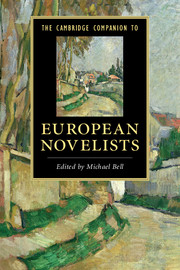Book contents
- Frontmatter
- Introduction: The novel in Europe 1600–1900
- 1 Miguel de Cervantes (1547–1616): Don Quixote: romance and picaresque
- 2 Daniel Defoe (1660–1731): Journalism, myth and verisimilitude
- 3 Samuel Richardson (1689–1761): The epistolary novel
- 4 Henry Fielding (1707–1754): The comic epic in prose
- 5 Jean-Jacques Rousseau (1712–1778): The novel of sensibility
- 6 Laurence Sterne (1713–1768): The fiction of sentiment
- 7 Johann Wolfgang von Goethe (1749–1832): The German Bildungsroman
- 8 Walter Scott (1771–1832): The historical novel
- 9 Stendhal (1783–1842): Romantic irony
- 10 Mary Shelley (1797–1851): The Gothic novel
- 11 Honoré de Balzac (1799–1850): ‘Realism’ and authority
- 12 Charles Dickens (1812–1870): Englishman and European
- 13 George Eliot (1819–1880): Reality and sympathy
- 14 Gustave Flaubert (1821–1880): Realism and aestheticism
- 15 Fyodor Dostoevsky (1821–1881): ‘Fantastic realism’
- 16 Leo Tolstoy (1828–1910): Art and truth
- 17 Émile Zola (1840–1902): Naturalism
- 18 Henry James (1843–1916): Henry James's Europe
- 19 Marcel Proust (1871–1922): A modernist novel of time
- 20 Thomas Mann (1875–1955): Modernism and ideas
- 21 James Joyce (1882–1941): Modernism and language
- 22 Virginia Woolf (1882–1941): Re-forming the novel
- 23 Samuel Beckett (1906–1989): Language, narrative, authority
- 24 Milan Kundera (1929–): The idea of the novel
- Conclusion: The European novel after 1900
- Further reading
- Index
- Cambridge Companions To …
20 - Thomas Mann (1875–1955): Modernism and ideas
Published online by Cambridge University Press: 28 September 2012
- Frontmatter
- Introduction: The novel in Europe 1600–1900
- 1 Miguel de Cervantes (1547–1616): Don Quixote: romance and picaresque
- 2 Daniel Defoe (1660–1731): Journalism, myth and verisimilitude
- 3 Samuel Richardson (1689–1761): The epistolary novel
- 4 Henry Fielding (1707–1754): The comic epic in prose
- 5 Jean-Jacques Rousseau (1712–1778): The novel of sensibility
- 6 Laurence Sterne (1713–1768): The fiction of sentiment
- 7 Johann Wolfgang von Goethe (1749–1832): The German Bildungsroman
- 8 Walter Scott (1771–1832): The historical novel
- 9 Stendhal (1783–1842): Romantic irony
- 10 Mary Shelley (1797–1851): The Gothic novel
- 11 Honoré de Balzac (1799–1850): ‘Realism’ and authority
- 12 Charles Dickens (1812–1870): Englishman and European
- 13 George Eliot (1819–1880): Reality and sympathy
- 14 Gustave Flaubert (1821–1880): Realism and aestheticism
- 15 Fyodor Dostoevsky (1821–1881): ‘Fantastic realism’
- 16 Leo Tolstoy (1828–1910): Art and truth
- 17 Émile Zola (1840–1902): Naturalism
- 18 Henry James (1843–1916): Henry James's Europe
- 19 Marcel Proust (1871–1922): A modernist novel of time
- 20 Thomas Mann (1875–1955): Modernism and ideas
- 21 James Joyce (1882–1941): Modernism and language
- 22 Virginia Woolf (1882–1941): Re-forming the novel
- 23 Samuel Beckett (1906–1989): Language, narrative, authority
- 24 Milan Kundera (1929–): The idea of the novel
- Conclusion: The European novel after 1900
- Further reading
- Index
- Cambridge Companions To …
Summary
To leading German writers in the 1920s – Thomas Mann, Hermann Broch and Robert Musil – it was clear that the modern novel must be in some sense philosophical. G. W. F. Hegel had asserted a century earlier that the novel was ‘the modern bourgeois epic’ (‘der modernen bürgerlichen Epopöe’). The Hegelian Marxist Georg Lukács, elaborating this idea in his Die Theorie des Romans (Theory of the Novel, published in book form in 1920), argued that, while Homer's epics showed a closed, limited, objective world and portrayed it as a totality, the complexity of modern life eluded any such depiction; the novelist could grasp the world as totality only through philosophical reflection. Hence everything in the novel, including the consciousness of the characters, had to be subordinate to the superior, and hence ironic, consciousness of the reflective narrator. Novelists in the German tradition found an honourable precedent in Johann Wolfgang von Goethe's classic Bildungsroman, Wilhelm Meisters Lehrjahre, where the naive protagonist stumbles towards his destiny under the ironic gaze of the sovereign narrator.
Not only in its structure, but also in its content, the novel needed to engage with the intellectual debates of the modern world. Mere storytelling risked triviality. The novel had somehow to accommodate diverse intellectual material. But how was this material to be integrated into fiction? What balance could be struck between the requirement of intellectual sophistication and the atavistic desire to have a story told? In their great works written in the 1920s – Mann’s Der Zauberberg (The Magic Mountain, 1924), Musil’s Der Mann ohne Eigenschaften (The Man Without Qualities, 1930–3) and Broch’s Die Schlafwandler (The Sleepwalkers, 1931–2) – the three novelists each found a different answer to these questions.
- Type
- Chapter
- Information
- The Cambridge Companion to European Novelists , pp. 343 - 360Publisher: Cambridge University PressPrint publication year: 2012

